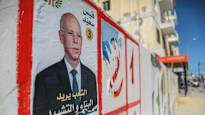After the Arab Spring, Tunisia was the only country that developed towards democracy. Now the direction is different, and it can be seen in Sunday’s elections.
NAIROBI Tunisians will vote in the presidential election on Sunday. It is likely that the sitting president Kaïs Saïed win.
There are only a few options available to the people: In addition to the President, two candidates have been allowed to run for office, and one of them was sentenced to 12 years in prison on Tuesday.
Sentenced to prison By Ayachi Zammel according to the lawyer, the verdict was due to falsification of documents. The lawyer called the verdict a farce and unfair.
Another candidate, Zouhair Maghzaouithe offer to the president does not object. He has criticized, for example, the president’s economic policy, but on the other hand supported him in centralizing power, reports news agency AFP.
The researcher interviewed by also gives a tired picture of Maghzaoui.
– The second candidate is a somewhat vague figure, and he is not a strong critic of the president, describes the researcher by Anthony Dwork a think tank from the European Council of Foreign Relations.
Dworkin is familiar with, for example, human rights, democracy and North Africa.
The election commission appointed by the president has decided on the candidates.
In Tunisia, it is about a big change. According to Dworkin, Tunisian presidential elections have been free and fair for more than ten years. Now this is not the first time since the Arab Spring.
Tunisia began to democratize after the Arab Spring
In 2011, power changed in Tunisia during the Arab Spring revolution. At that time, authoritarian regimes also fell in Egypt, Libya and Yemen.
Tunisia has been considered the only country that really started to democratize after the Arab Spring.
Dworkin describes the transformation of Tunisia after the Arab Spring in the video below.
The 2019 presidential elections were free. At that time, law professor Saïed came to power with a clear victory, who promised to root out corruption and kick new momentum into the economy. The economy is still doing poorly: Unemployment is over 15 percent and poverty has increased due to high inflation.
According to researcher Dworkin, Saïed has tried to undo all the progress that was made in the revolution.
A couple of years after his election, Saïed dismissed the prime minister, abolished the parliament and concentrated power for himself. He created a constitution that cemented his power. The new legislation clearly limits freedom of expression and gives the opportunity to put critics behind bars.
Dworkin says that the president has tried with the help of the security services and the judiciary to prevent criticism of him.
– Tens, maybe even hundreds of people have been arrested on various charges. Political opponents, civil society actors, lawyers and journalists.
Human rights organization by Human Rights Watch according to more than 170 people in Tunisia are detained on political grounds or because they have exercised their basic rights.
The opposition has not shut up
The president still faces resistance. Tunisia’s administrative court tried to interfere in the selection of presidential candidates.
The Administrative Court ruled that three of the candidates rejected by the Election Commission should be allowed to run in the elections. The Election Commission didn’t care about this, and the president got the parliament to strip the administrative court of its decision-making power.
– These three candidates had the most significant public profile. They could have been a threat to the president, says Dworkin.
Tunisians have been protesting the tightening of political freedoms and the president’s economic policy in the streets. The manner in which the presidential elections are organized has also caused outrage. For example, the lawyers’ association has called for demonstrations. A major trade union has also opposed the president.
– So he doesn’t have the whole country under his control, and he hasn’t succeeded in silencing the opposition, says Dworkin.
According to Dworkin, what is more interesting than the actual result in elections is what the turnout will be.
– There is no wider competition about who will win the election. But whether people consider the elections to be legitimate and credible, or whether a large part of the people will turn their backs on the elections.
